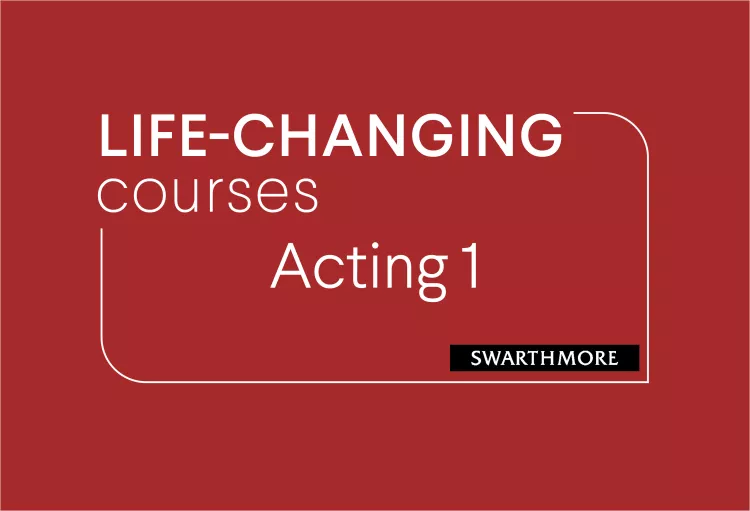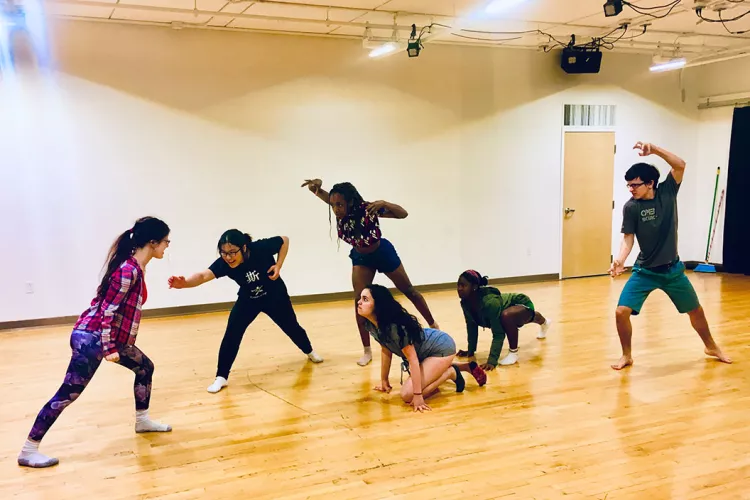Life-Changing Courses: Acting I

This is the second profile in a series on transformative courses at the College. To nominate a course to be profiled, email news@swarthmore.edu.
Somehow while running his theater company Team Sunshine Performance Corporation, juggling multiple productions each year, and teaching several other classes, Visiting Assistant Professor of Theater Alex Torra has also created a beloved class at Swarthmore. Acting I is rooted in the technical aspects of theater, but the real focus is on helping students overcome feeling vulnerable.
“‘Acting’ is really just a cover,” Torra jokes. Theater is not only art, he says, but also an important tool “for empowerment and liberation for me and for my students.”
“I’ve found a lot of meaning in my life being in community with people on artistic projects,” adds Torra. “The work I’ve done has helped me become more comfortable taking personal risks, especially the risk of being seen.”
Torra describes himself as an introvert, but you’d never guess it from his infectious love of theater and the sense of community he creates in class. These qualities allow students to feel comfortable in taking this “risk of being seen.”
“We were being asked to think outside the box, to work with other people, to build performance techniques … and stretch our limits,” says Keton Kakkar ’19, who took the class two years ago and is now a computer scientist in New York. “There is totally a sense of community.”
In Acting I, Torra intentionally creates a space for all students, including those who weren’t necessarily “theater kids” in high school. As each class begins, students check in with one another. Vocal warmups aren’t just vocal warmups — they are Ukrainian holiday songs Torra learned from a Swedish theater group, Sláva. In keeping with the Sláva technique, students learn the various parts of a song by ear and then combine the singing with physical actions, such as raising and lowering an imaginary boulder or running together.
“Alex just made it fun,” says Kakkar. “The course is very embodied — you’re connecting the theory of performance studies to the body.”

Acting I is rooted in the technical aspects of theater, but the real focus is on helping students overcome feeling vulnerable.
For Meena Chen ’21, an accomplished dancer who had never studied acting, the course helped her focus on the more vocal aspects of theater. “We learned how your breath dictates your voice, and an issue for me in life is having a quiet voice,” says Chen, an environmental studies major from Greenburgh, N.Y. The class helped her to work on intentionally finding more volume in her voice.
“Alex was a great teacher and made the material very relatable,” she adds. “I’d never acted before, so it was very scary. Finishing my monologue was a very accomplished feeling.”
Additional assignments for the class include weekly journal entries, presentations on histories and theories of acting, and performances of increasing levels of collaboration. Students rehearse and perform monologues and then two-person scenes, and in recent semesters, Torra has added a classwide group scene as the culmination of their work
Encouraging students to embrace their vulnerability, Torra says, is one of the most rewarding aspects of the class. “It’s so beautiful when you literally watch someone breathe, check themselves, and then say, ‘I’ve got this’ … and then they do it,” he says. “There are these powerful moments where people are suddenly willing to take a giant risk and begin to discover a joy and thrill in things that are normally really scary.”
Torra will next teach Acting I in fall 2021.



